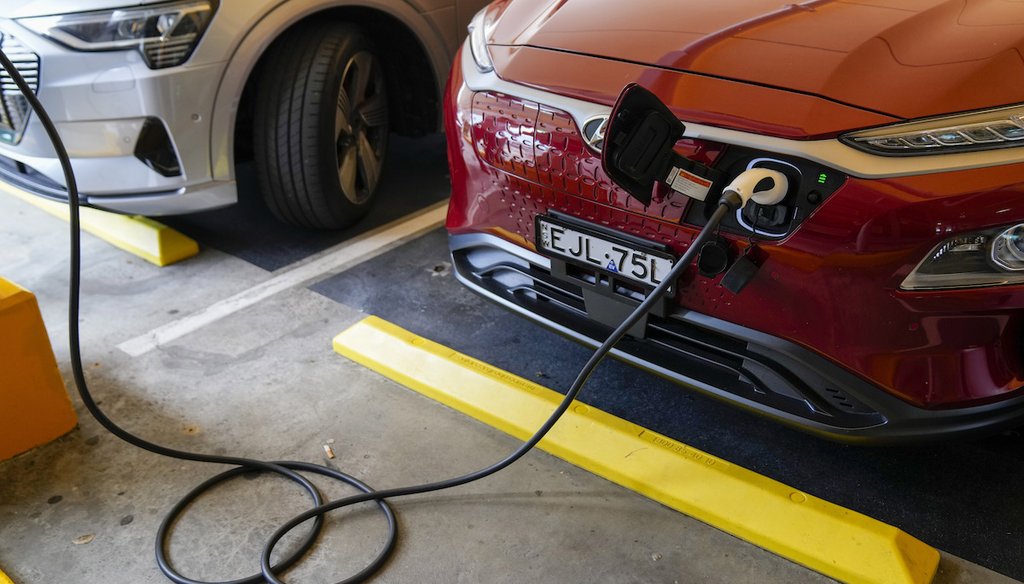

Our only agenda is to publish the truth so you can be an informed participant in democracy.
We need your help.


An electric car gets charged at a supermarket parking lot in Sydney, Australia. (AP)
A video shared on Facebook painted an ominous picture of electric vehicles, claiming they could be centrally controlled through software on the internet.
The narrator said he didn’t like the idea of being in a "giant computer that can be controlled remotely from some cloud-based central grid. I don’t want a self-driving car telling me where I can and cannot go in the future."
The post was flagged as part of Facebook’s efforts to combat false news and misinformation on its News Feed. (Read more about our partnership with Meta, which owns Facebook and Instagram.)
Technology and privacy experts said that theoretically, any vehicle equipped with a computer — electric or not — could be centrally controlled, but that would require technology that is not in place today.
"Is there anything inherent in the design of a self-driving car that would allow it to be controlled from a central location? No," said Johns Hopkins University mobility services researcher Jeffrey Michael.
Cloud computing is the use of remote servers to store data and deliver related computing services to large numbers of users.
Self-driving vehicles "have the capacity to be connected to a larger grid and controlled to the same extent that airplanes are connected to a network for air traffic control," said Albert Gidari, a fellow at Stanford University’s Center for Internet and Society.
But Cooper Quintin, a technologist with the Electronic Frontier Foundation, a nonprofit digital rights group, said there is no central grid that controls electric vehicles — even of a single brand.
Daniel Kahn Gillmor, a privacy and technology expert at the American Civil Liberties Union, said that if you’re a passenger in a self-driving vehicle, "the folks who control how the self-driving system operates can dictate what the vehicle will or won't do.
"But is that the same as a supervillian in their lair steering you into a ditch from their keyboard? No."
Jennifer King, a fellow at Stanford University’s Institute for Human-Centered Artificial Intelligence, said that a vehicle’s artificial intelligence can decide whether to go or stop. And, theoretically, controls could be put on vehicles to prevent them from exceeding a speed limit, she said.
"But there’s not any individual at a home office literally controlling your vehicle," King said.
That would require exceptional bandwidth and, she said, "I don’t think we’re anywhere near that point."
Although it’s theoretically possible to centrally control vehicles, electric or otherwise, there is no evidence it is occuring widely.
The statement contains an element of truth but ignores critical facts that would give a different impression.
We rate it Mostly False.
Facebook, post (archived) May 10, 2023
Email, Daniel Kahn Gillmor, senior staff technologist for the American Civil Liberties Union’s Speech, Privacy and Technology Project, May 26, 2023
Email, Cooper Quintin, senior public interest technologist, Electronic Frontier Foundation, May 26, 2023
Interview, Jennifer King, privacy and data policy fellow at Stanford University’s Institute for Human-Centered Artificial Intelligence, May 26, 2023
Email, Johns Hopkins University mobility services researcher Jeffrey Michael, May 26, 2023
Email, Yen Chen, senior industry economist, Center for Automotive Research, May 26, 2023
Email, privacy lawyer Albert Gidari, non-residential fellow, Stanford University’s Center for Internet and Society, May 26, 2023
In a world of wild talk and fake news, help us stand up for the facts.
